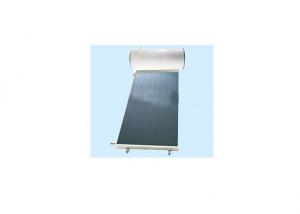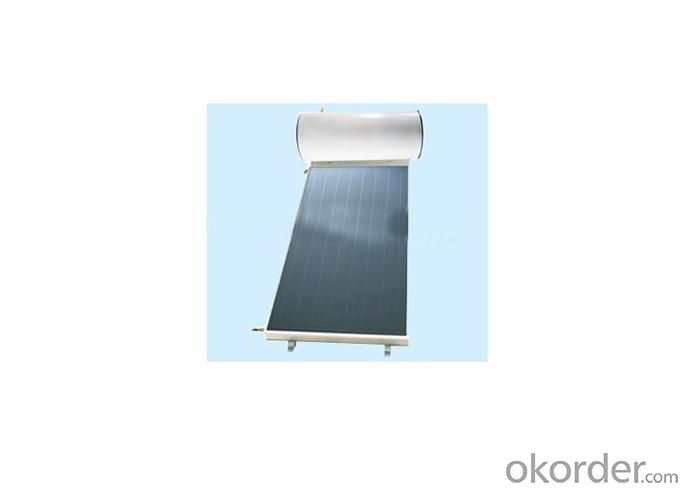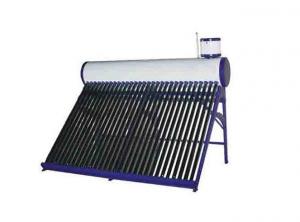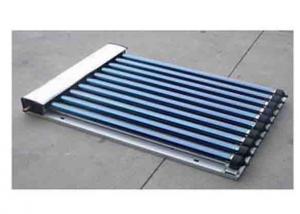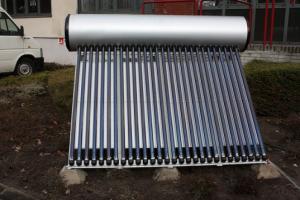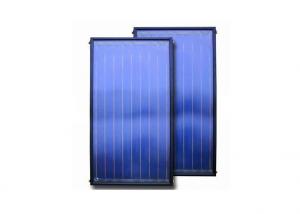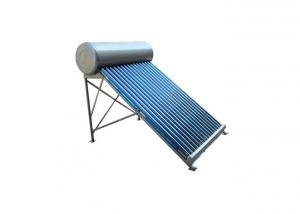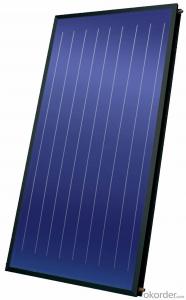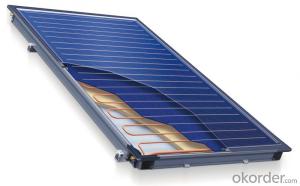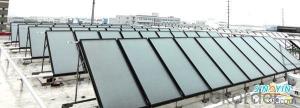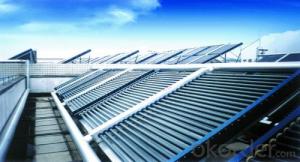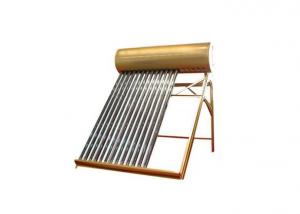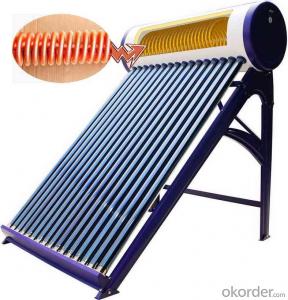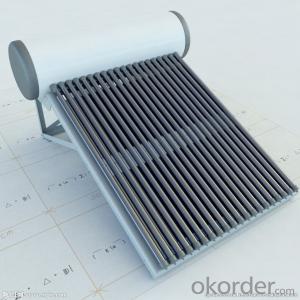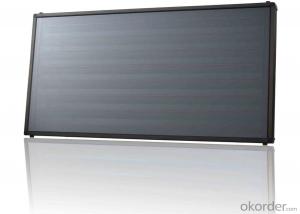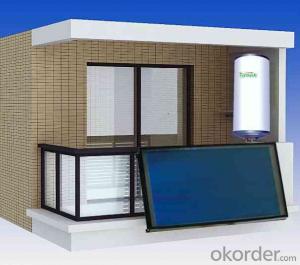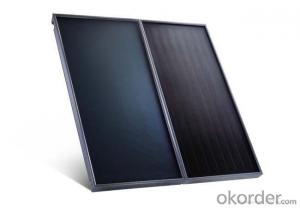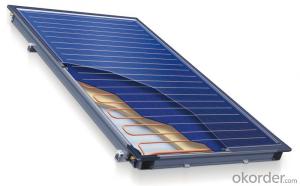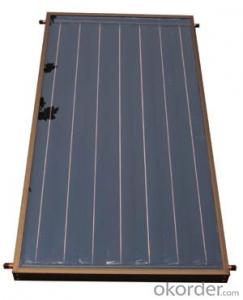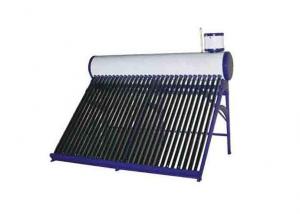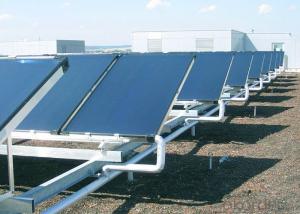Residential Solar Collectors - High Quality Solar Water Heater
- Loading Port:
- China Main Port
- Payment Terms:
- TT or LC
- Min Order Qty:
- 5 Pieces pc
- Supply Capability:
- 20,000 Pieces per Month pc/month
OKorder Service Pledge
OKorder Financial Service
You Might Also Like
Detailed Product Description of High Qualiaty Solar Water Heater
1)High efficiency
2)High quality
3)Long life span
4)Beautiful design
Tube:
1) Material of cover tube: Borosilicate glass
2) Diameter of cover tube:58mm
Thinckness of cover tube:1.6mm
3) Diameter of inner tube:47mm
Thickness of inner tube:1.6mm
4)Transmission of the cover tube:>94%
5)Selective coating:ALN/ALN-SS/CU
6)Emissivity coeffcient:<7%
7)Distance from tube to tube:7.8mm
8)Material of the absorber pipe:copper
9)Dimension of heat pipe: condensor, Φ14mm*1mm, body, Φ 8mm*0.8mm
Manifold:
1)Material of the header pipe:copper
2)Dimension of the header pipe:Φ35mm* 1mm
3)Inner flowing pipe of manifold :Φ22mm*1mm
4)Material of manifold: Aluminum alloy
5)Thickness of manifold:2mm
Insulation:
1)Material of insulation: Polyurethane or rockwoode
2)Thickness of the insulation: 35mm or 45mm
3)Sealing material:rubber
Bracket
1)Material:aluminum alloy
2)Thinckness:1.8mm
- Q: Can solar collectors be used to generate electricity for electric vehicles?
- Yes, solar collectors can be used to generate electricity for electric vehicles. Solar panels can convert sunlight into electricity, which can then be used to charge the batteries of electric vehicles, providing a sustainable and clean source of energy for transportation.
- Q: Can solar collectors be used in areas with limited skilled labor?
- Yes, solar collectors can be used in areas with limited skilled labor. Solar collectors are designed to be user-friendly and require minimal maintenance. Additionally, many manufacturers provide detailed installation instructions and support to ensure proper setup. In areas with limited skilled labor, training programs can be implemented to educate local communities on the installation and maintenance of solar collectors, empowering them to utilize this renewable energy source effectively.
- Q: Can solar collectors be used for generating electricity on warehouses?
- Yes, solar collectors can be used for generating electricity on warehouses. Solar collectors, also known as solar panels, can be installed on the rooftop of warehouses to harness sunlight and convert it into electricity. These panels are made up of photovoltaic cells that absorb sunlight and generate direct current (DC) electricity. This DC electricity is then converted into alternating current (AC) electricity through an inverter, which can be used to power the electrical systems within the warehouse or even feed excess electricity back into the grid. Solar collectors are a sustainable and environmentally-friendly way of generating electricity, as they rely on renewable energy sources and produce zero greenhouse gas emissions. Additionally, installing solar collectors on warehouses can help businesses reduce their dependence on fossil fuels, lower their electricity bills, and contribute to a cleaner energy future.
- Q: Can solar collectors be used for generating electricity on farmland?
- Solar collectors have the potential to generate electricity on farmland. These devices, also called solar panels or photovoltaic (PV) cells, convert sunlight into electricity using the photovoltaic effect. Farmland offers ample space for the installation of solar panels, enabling the efficient utilization of solar energy. Moreover, farmers can generate their own clean and renewable energy by incorporating solar collectors on their land, ultimately reducing their reliance on conventional energy sources. This transition can result in substantial cost savings and promote a more sustainable and eco-friendly farming operation. Additionally, solar collectors can be set up on elevated structures, such as poles or racks, to minimize disruption to agricultural activities and ensure continued land usability for farming purposes. All in all, solar collectors present a feasible and advantageous choice for electricity generation on farmland.
- Q: Can solar collectors be used in educational institutions?
- Yes, solar collectors can definitely be used in educational institutions. They are a great way to demonstrate and teach students about clean and renewable energy sources. Installing solar collectors in educational institutions can provide hands-on learning opportunities, showcase environmental sustainability, and reduce energy costs. Additionally, it can inspire and educate students about the importance of utilizing renewable energy and encourage them to consider careers in the field.
- Q: Can solar collectors be used in combination with greenhouses or indoor farming systems?
- Yes, solar collectors can indeed be used in combination with greenhouses or indoor farming systems. Solar collectors, such as photovoltaic panels or solar thermal collectors, can provide renewable energy to power the various systems within greenhouses or indoor farming setups. In greenhouses, solar collectors can be used to generate electricity for lighting, heating, ventilation, and irrigation systems. The electricity produced can be used to power artificial lighting during periods of low natural light, ensuring optimal growing conditions for plants. It can also be used to operate heating systems to maintain the desired temperature levels, especially during colder months. Additionally, solar collectors can power ventilation fans and systems, ensuring proper air circulation and preventing the buildup of excessive humidity or carbon dioxide. Moreover, solar collectors can be utilized to power irrigation systems, enabling efficient watering of crops, minimizing water waste, and promoting sustainable farming practices. In indoor farming systems, solar collectors can also play a crucial role. By harnessing solar energy, indoor farms can reduce their reliance on traditional energy sources, thereby decreasing their carbon footprint. Solar collectors can provide electricity to power LED lights, which are commonly used for indoor farming to simulate natural sunlight and optimize plant growth. Additionally, solar collectors can be used for heating and cooling systems to maintain the ideal temperature for crops. This renewable energy source can also power ventilation systems to ensure proper air exchange within the controlled environment. Overall, integrating solar collectors with greenhouses or indoor farming systems can enhance sustainability, reduce energy costs, and promote environmentally friendly agricultural practices. By utilizing renewable energy, these systems can contribute to a more sustainable and efficient approach to farming, reducing reliance on fossil fuels and mitigating the impact of traditional energy sources on the environment.
- Q: Are solar collectors suitable for restaurants and cafes?
- Restaurants and cafes can benefit from using solar collectors. These devices, such as solar panels or solar water heaters, offer a cost-effective and eco-friendly solution to meet the energy demands of these establishments. Given the continuous operation of kitchen equipment, lighting, and HVAC systems, among other things, restaurants and cafes tend to have high energy consumption. To generate electricity from sunlight, solar panels can be installed on the rooftop or any available space. This renewable energy source can power various appliances and equipment, reducing reliance on grid electricity and, consequently, lowering energy bills. Moreover, solar panels contribute to sustainability efforts by reducing carbon footprints and combating climate change. Solar water heaters are another viable option for restaurants and cafes, providing a significant portion of the hot water needed for cooking, cleaning, and beverage preparation. By utilizing the sun's energy to heat water, these establishments can reduce dependence on fossil fuel-based water heating systems, resulting in both energy and cost savings. Additionally, adopting solar technology can serve as a positive marketing strategy for restaurants and cafes. Customers are increasingly conscious about supporting businesses that prioritize sustainability and environmental responsibility. By showcasing the use of solar collectors, establishments can attract environmentally-conscious customers, differentiate themselves from competitors, and enhance their brand image. In conclusion, solar collectors offer a suitable and advantageous choice for restaurants and cafes, providing cost savings, environmental benefits, and marketing opportunities.
- Q: Are there any size limitations for solar collectors?
- Yes, there are size limitations for solar collectors. The size of a solar collector is determined by various factors such as the available space, the amount of sunlight in the area, and the specific requirements of the system. However, it is possible to create larger solar collectors by combining multiple smaller ones or using advanced technology to increase their efficiency.
- Q: Can solar collectors be used for heating car manufacturing plants and assembly lines?
- Yes, solar collectors can be used for heating car manufacturing plants and assembly lines. Solar thermal systems can provide a sustainable and cost-effective solution for industrial heating needs, including space heating and process heating in large facilities. By harnessing the sun's energy, solar collectors can generate heat which can then be used for various heating applications in car manufacturing plants and assembly lines.
- Q: How does a solar collector work?
- A solar collector works by absorbing sunlight and converting it into usable heat or electricity. It consists of a series of panels or tubes that contain a fluid or material capable of absorbing solar energy. When sunlight hits the collector, the fluid or material absorbs the energy and heats up. This heat can then be used to heat water, buildings, or generate electricity through various mechanisms like heat exchangers or photovoltaic cells.
1. Manufacturer Overview
| Location | Zhejiang,China |
| Year Established | 2005 |
| Annual Output Value | US$2.5 Million - US$5 Million |
| Main Markets | North America South America Eastern Europe Southeast Asia Africa Oceania Mid East Eastern Asia Western Europe Central America Northern Europe Southern Europe Domestic Market |
| Company Certifications | ISO9001:2008;ISO14001:2004 |
2. Manufacturer Certificates
| a) Certification Name | |
| Range | |
| Reference | |
| Validity Period |
3. Manufacturer Capability
| a) Trade Capacity | |
| Nearest Port | Shanghai,Hangzhou |
| Export Percentage | 41% - 50% |
| No.of Employees in Trade Department | 6-10 People |
| Language Spoken: | English, Chinese |
| b) Factory Information | |
| Factory Size: | 5,000-10,000 square meters |
| No. of Production Lines | 5 |
| Contract Manufacturing | OEM Service Offered Design Service Offered Buyer Label Offered |
| Product Price Range | Average |
Send your message to us
Residential Solar Collectors - High Quality Solar Water Heater
- Loading Port:
- China Main Port
- Payment Terms:
- TT or LC
- Min Order Qty:
- 5 Pieces pc
- Supply Capability:
- 20,000 Pieces per Month pc/month
OKorder Service Pledge
OKorder Financial Service
Similar products
Hot products
Hot Searches
Related keywords
